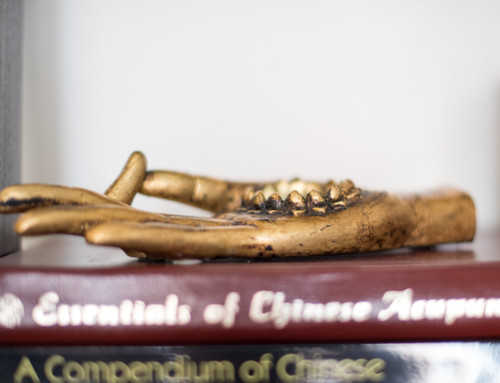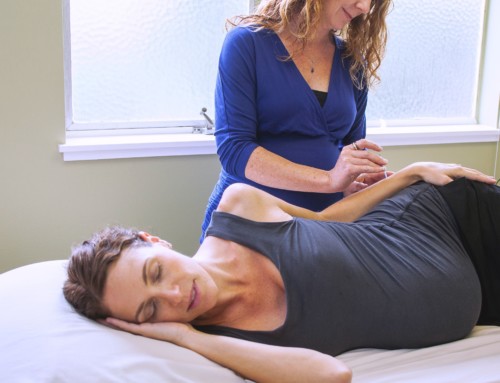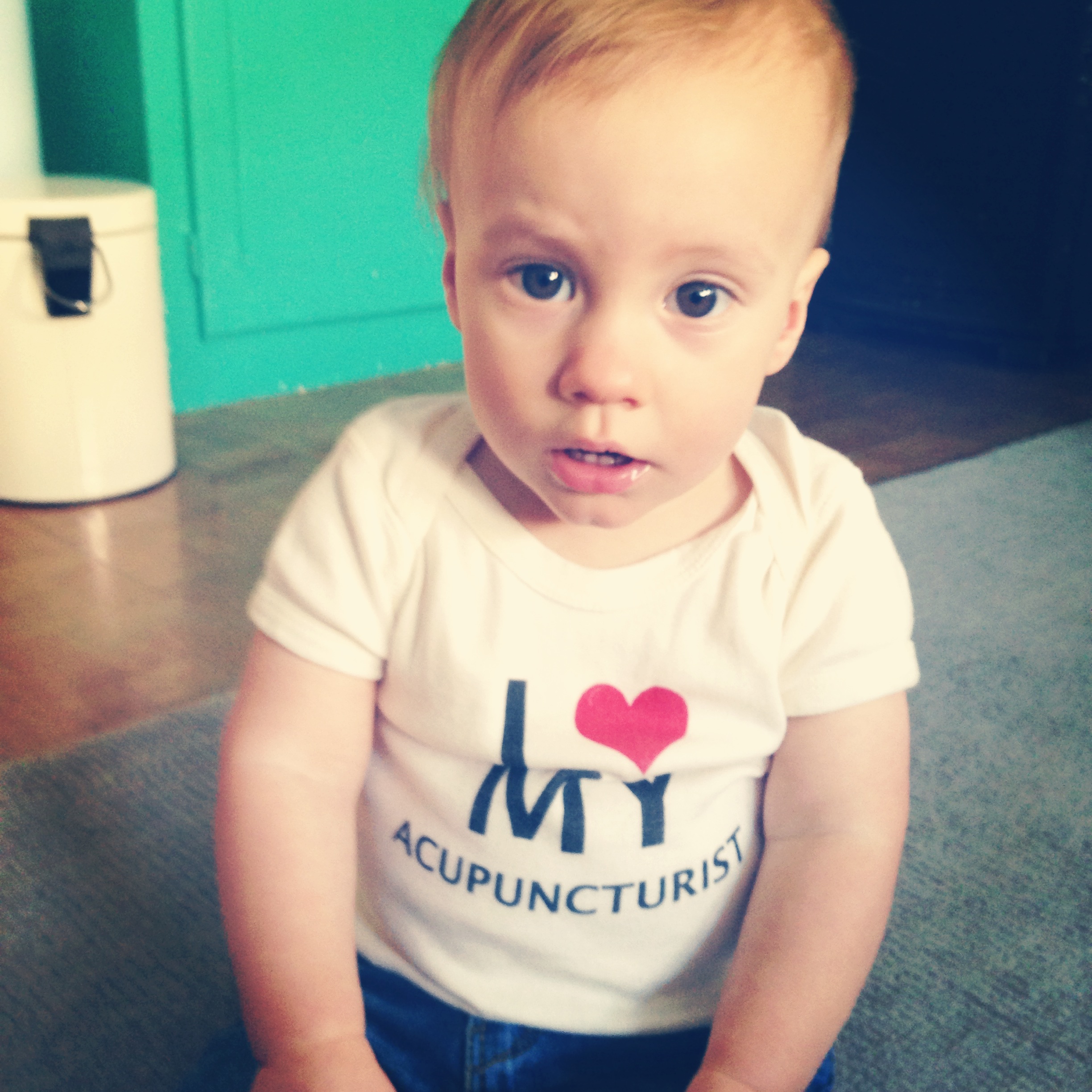Ah, springtime is here. The days are longer, the cherry blossoms are blowing in the wind, things are starting to heat up, and at the back of many a young fertile female’s mind is the consistent nagging thought, How Do I Keep From Getting Pregnant?
Chinese Medical theory does not support oral contraceptives (OCP’s) and many other pharmaceutical forms of birth control. We worry about the long-term risks of suppressing female hormones, sometimes for decades, putting the body at risk of not being able to regulate itself and risking infertility. But on a practical level, I realize this is a much more complicated issue and ultimately believe in the importance of educating a woman as to her cycle, and working together to find the perfect means of birth control.
One of my go-to references in this department is my sister, Elisabeth. She has been a women’s reproductive health counselor for years. She sent me my first family planning beads when I went off the pill myself, and pulled out her own IUD when her body reacted horribly to it. She’s a tough girl and a feminist at heart so if anyone out there knows about the perfect method to control your “reproductive destiny” it’s her. Below she answers a few questions for me.
When can a woman get pregnant?
Oooh. That’s tricky and arguably an ultimate mystery, but most women tend to be most fertile, and therefore most likely to become pregnant, approximately one week to two weeks after the first day of their menstrual period. The first day of a woman’s period is considered Day One of her cycle and most ovaries will release an egg (or ovulate) between Day Seven and Fourteen, but all women are different and some may ovulate on Day Two or day Twenty-One, some may ovulate twice in one cycle, and some women may not ovulate at all.
As the egg travels from the fallopian tube to the uterus, it is susceptible to fertilization. This process can take a few days and a woman can get pregnant if live sperm meet the egg in the fallopian tube, also known as, fertilization. Not all fertilized eggs implant on the uterine wall but when one does, a woman is officially pregnant.
How do OCP’s work?
Oral Contraceptives are composed of synthetic hormones—either combined estrogen and progesterone or progesterone-only—that modify naturally occurring hormone levels in the female body. The increased level of hormones mimic the early stage of pregnancy. Theoretically, OCs inhibit ovulation because the body believes it is already pregnant and if the ovaries are not releasing eggs then a woman cannot get pregnant.
What do you think the most common form of birth control is?
That is a broad question and likely varies among women of various ages and milestones throughout life. My greatest guess would be withdraw, condoms, or no birth control at all – rather a mythical belief that one cannot get pregnant. Among hormonal birth control methods, oral contraceptives remain the most popular option in the United States. Likely, this is due to their affordability and perceived simplicity. Though, IUDs are certainly growing in popularity.
How do you feel about birth control that suppresses the period entirely?
That’s a complicated question and my answer varies depending on the situation. My personal instinct is that it creeps me out. However, I’ve experienced relatively pain-free and simple menstrual cycles my entire life.
If a woman desires to suppress her periods, there are a myriad of hormonal options available to her, primarily progesterone-only methods such as the shot, the pill, and the Mirena and Skyla IUDs. With higher levels of progesterone in the body, the woman will rarely produce a blood lining and will likely not bleed much or at all on a monthly basis. Some women feel comfortable with these methods for a myriad of lifestyle and health reasons and I recommend these methods, especially the IUDs and pills to many women who seem like they would prefer this method.
I’ve learned that many women prefer to either suppress or lighten their period and the accompanying side effects due to long histories of painful or heavy periods.
Some women prefer an occasional cosmetic fix during special occasions such as weddings and vacations. They may modify their method of usage with combined oral contraceptives according to directions for continuous use. Again, until I talked with other women, it never occurred to me that a period could be so arduous or painful that I’d fear soaking my gown or spending my time in paradise in cramping misery.
Alternatively, some women prefer their period, whether it’s synthetically motivated, as with combined hormonal contraceptives, or not. To them, this may be a sign that they are regular, and indeed, not pregnant.
Beyond feelings, I continue to wonder what is best for the body. It seems a regular period is some indication of wellness but I think it’s important that a woman who dreads her period, explore holistic options for improvement. If all else fails, there is a synthetic remedy.
What’s your opinion on the Nuva Ring?
The Nuva Ring seems a milder version of most hormonal methods and is growing in popularity. It seems best for women who are sensitive to higher levels of combined hormonal levels and are comfortable enough to insert and maintain the vaginal ring. It seems a preferred method of birth control among some of my friends but remains an expensive option due to the fact that it is patented and non-duplicable by generic standards.
IUDs?
The Paragard seems a popular option for women who prefer a hormone-less, long-term method of contraception. It lasts for twelve years, which makes it one of the least expensive options available. Some, but not all, women are more likely to experience increased bleeding and cramping with periods and that’s quite a bummer.
The Mirena is an ever-growing and popular option. It is a five-year IUD. Opposite of the Paragard, it often lightens bleeding and cramping with periods. This is due to the fact that it releases a trace amount of progesterone into the uterus over the five-year span. This slight increase in progesterone can aggravate side effects for some women.
There is a new IUD—Skyla—on the market as well. It is slightly smaller and slightly less hormonal than the Mirena and is recommended for women who have not yet had children.
Coincidentally, I had a Mirena inserted and removed within one week. I was one of those rare women who felt aggravated by the slight foreign object in my uterus and nearly expelled the device in a fit.
Barrier method?
There are many barrier methods—condoms, dams, caps, diaphragms—and I think they make excellent short term, and sometimes long term, methods. It really depends on the person. For example, some people use condoms as a primary method of birth control and I think that’s great. They’re effective and they can prevent the transmission of all sorts of infections. However, for many people, including myself, barrier methods work best with casual encounters and new relationships, but serve as a barrier to a more pleasurable intimacy with long-term partners. More to the point, they can be awkward and uncomfortable.
Fertile Focus or ovulation strips?
Fertile focus is a tiny device shaped like a tube of lipstick that you spit into each morning and it reads your saliva to determine if you’re ovulating. These forms are most commonly used by women hoping to get pregnant and new mamas looking for the return of their cycle.
What are the side effects of being on birth control long term?
Oof. It’s hard to tell and it varies from person to person. Sometimes there are no evident side-effects and other times the side-effects become evident once a woman quits a form of birth control and struggles to have a normal cycle again, usually to get pregnant or just give her body a break from the chemicals.
Ultimately, the most positive side effect is that the woman was able to control her reproductive destiny. The negative side effect may be that the body’s chemistry is altered and sometimes it can takes years for the body to return to a natural cycle.
I have a memory of sitting in 8th grade health class, girls only, and they were passing around a baby doll. Then they brought in the boys and showed us a gruesome video of the baby being born. How would you improve sex education in high schools where it’s most important?
In a perfect world, I would expand sex education instead of treating it like a special topic covered during health class. I wish educators spent as much time on sexual and reproductive health as they do on math or history. Indeed, one’s sexual health spans a lifetime while one’s ability to solve complex math problems may be isolated to the classroom.
There are school districts that are getting it right. Often, they hire outside experts to cover topics ranging from birth control options to STD prevention to sexual desire. Often outside experts have the freedom to be more explicit and the information is more cutting edge.
But birth control and STDs are only small slices of the pie. It would be beautiful if our early education was a spring board for a lifetime of compassionate and contemplative sexuality, as well as mindful, holistic health.
How would you respond to the following from a patient:
Ew, I don’t want to touch my cervix.
“Why?” I would imagine that they have an aversion to the unknown or slimy things. But perhaps they’ve been raised to associate their genitals with shame and disgust. Ultimately, I would want to meet the patient wherever she is and offer her a positive outlook on exploring her body.
I don’t feel comfortable denying my boyfriend when I know I’m ovulating.
Again, “Why?” But also, “Do you feel safe?”
Is she embarrassed to address her reproductive cycle or is she choosing to engage in a relationship where her body is not valued as much as her partner’s body—an imbalanced and potentially abusive relationship. I would want to assure her that she deserves to feel comfortable in her intimate relationships but I would also want to empower her to value her body and her needs. If she does not wish to become pregnant and chooses to stay in such a relationship, I would recommend a form of contraception that is completely her responsibility such as the pill or the IUD.
A lot of GYN’s prescribe birth control for the following: pms cramping, irregular periods, acne, anovulation. Is there another solution?
I think you know the answer to that.
But more importantly, this question highlights the importance of questioning our health care providers and challenging them to find solutions outside the pharmaceutical realm. Drugs can make an awesome, life-saving impact in many circumstances but often tax the liver and threaten the body’s ability to naturally regulate. Thus, creating a dependency rather than a cure.





